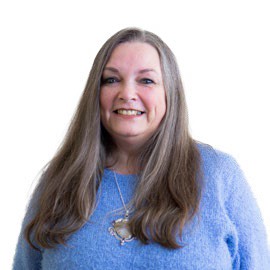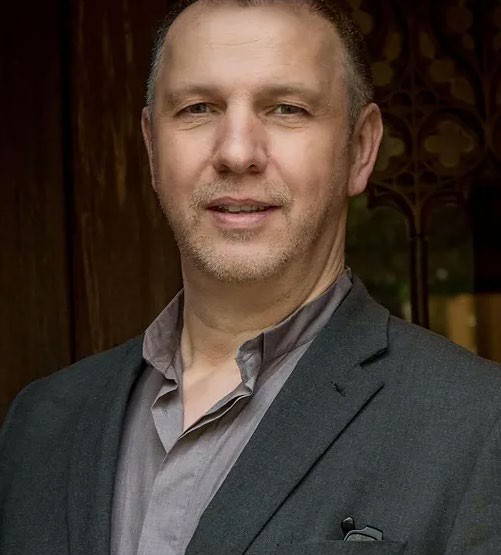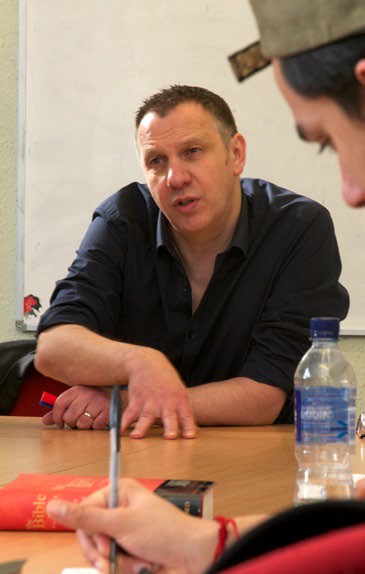‘We are facing huge challenges’
Jackie Macadam learns more about the life and work of the practical theologian the Rev Dr Doug Gay, author of Reforming the Kirk.

Jackie Macadam
“THE most important challenge in any generation is following Jesus, in our personal lives, in our congregational lives, in our political lives. A friend once said to me: ‘The Christian mind is first and last a repentant mind’ and I have never forgotten that.”
The Rev Dr Doug Gay could arguably be called one of the most important and influential thinkers in the Church of Scotland today. His ideas for reform of the Church as an organisation, have been the backbone, to a large extent, of the reforms now rippling through the entire Church.
But his theology lies squarely in discipleship.
“To be a disciple is be called into metanoia, a life-long process of turning towards life, towards truth, towards beauty, towards justice – and turning away from all that reduces us, all that deals death, all that breeds violence or fuels poverty. In turning towards God in Christ, by the Holy Spirit, we are challenged to do all of that,” he says.
Doug did not have a traditional Church of Scotland upbringing.
“I was born in Dumfries and raised in Castle Douglas in south west Scotland, where my family were members of an Exclusive (Plymouth) Brethren Assembly in a period when it had developed some disturbing behaviour patterns and was deeply committed to separation from the world,” he explains.
“We were taught that we were the only true Christians who really followed the bible and that people in the Kirk almost certainly weren’t saved.”
Being part of the group meant that Doug was not allowed to participate in some school activities, and even classes.
“I was withdrawn from Religious Education at primary school and not allowed to eat school meals or join the Cubs etc so my difference from other kids led to a degree of bullying. By secondary school things had eased and I was allowed to go to Scripture Union camps, where I met David Geddes and Boss Meiklejohn, who became important influences on my life, particularly David whose honest, humble and committed discipleship I was deeply impressed by. Other than that, at school it was my English teachers who saved me, introducing me to a world of imagination, poetry, art and free thinking, as well as allowing us to discuss politics and current issues in class.”
It was at university that Doug’s relationship to Christianity really began to take shape.
“I was deeply involved with the Christian Union (CU) and became President – although I also attended Student Christian Movement (SCM) because it was more political and enjoyed a good relationship with the then chaplain Iain Whyte. CU was very important to my faith development. It was where I really discovered mainstream Reformed theology. University and Colleges Christian Fellowship (UCCF) was inspired by them to promote the idea that Christians should be disciples in every area of their life and studies and actively encouraged involvement in politics and the arts, which were two of my great passions. UCCF staff like Harry Smart were important mentors for me and he has remained a life-long friend.”
Music is another passion and Doug embraced the musical aspects of spirituality.
“From the age of 18, Greenbelt Festival became an important influence and I have been to most festivals over the past four decades. During my university years, I became involved with Street Level Arts festival in Dundee, where I met John Bell and Graham Maule, Tim Edwards, Ricky Ross and Andy Thornton and of course the great (Dr) Jock Stein, who I could never have dreamt I would one day be PhD Supervisor for! From a very claustrophobic fundamentalist beginning, at every stage thereafter, beginning with David Geddes, there were folk who opened spiritual doors and windows for me and showed me a healthy, honest and intellectually vibrant form of faith which has always felt like a rich space in which to live my life.”
“In London, my United Reformed Church (URC) minister was the Rev Dr Lance Stone, a lifelong inspiration and mentor for me. It was because of him that I became a candidate for ministry from the Presbytery of England and returned to Scotland to study at Trinity College, University of Glasgow. My first ten weeks of theology were taught by Lesslie Newbigin, who was a visiting lecturer and was completely inspirational. I did placements with Gordon Palmer, Malcolm Cuthbertson and John Bell (took a year out from my BD to play in a band and record an album) and after my BD I worked with the wonderful Leith Fisher at Wellington Church for a couple of years.” He met his wife, Rachel, a consultant clinical psychologist, while he was living in London. They have three grown-up children.
“When Rachel took a job in Hackney, East London, where I had lived before, I was ordained and inducted to a URC Church in Clapton, on a road then known as ‘murder mile’. After seven very fulfilling years as minister there, I was awarded a scholarship and returned to Scotland to take up doctoral studies at the University of Edinburgh. As I finished in 2005, I was offered my current job teaching Practical Theology at Glasgow University.”
It is this lifelong blend of practical theology and contemporary church life that led to Doug shaping his ideas about the direction the church needed to think about going.
“I have been a committed Scottish Nationalist since my late teens, when I first read a remarkable poem called The Midge, by Fearghas MacFhionnlaigh about faith and national identity,” he says, “so I had a cluster of interests around ‘Church and Nation’ in Scotland and these developed alongside other interests in the theology of mission and sociological theories of secularisation. I remained intellectually convinced by and personally committed to Christianity, but it was clear that in my lifetime, many folk in Scotland were abandoning faith and/or religious participation. I was interested in that divergence and in how the Church of Scotland then tried over successive decades to respond to decline and to find new ways to take part faithfully in the mission of God.
“
I worry that some larger congregations may decide to leave the Kirk completely, even if this means leaving their buildings and have even heard of presbyteries contemplating breaking away, due to their despair over implementing the planning process.”
“I wrote Reforming The Kirk out of some deep concerns for the future of the Church. I felt that our national structures were too unwieldy and that we had unfinished business with presbytery reform. In my Chalmers Lectures I argued for a leaner, more focused centre and for fewer, more powerful presbyteries. The Church, following the Special Commission, has indeed moved in that direction, although because the central reforms came first and presbytery reforms are still being implemented, I feel the centre is probably flexing its muscles too much at the moment and we have yet to properly empower presbyteries and give them financial muscle and independence.
“Five other areas are still facing huge challenges: We’ve not yet got the financial model right; we are still facing a severe vocations crisis; we still haven’t grasped the nettle of reforming how we educate and train folk for our recognised ministries (Word and Sacrament, the Diaconate and Readership); we need to reform eldership to include an option for shortterm commissioning alongside life-long ordination and reform ministry to remove unlimited tenure; and we have made very slow progress in planting new churches (fresh expressions) and finding ways to replant where congregations are not thriving.

Rev Dr Doug Gay
“The biggest immediate challenge is clearly the current mission planning process, which is causing huge distress and discouragement across the church, despite the best intentions of those who designed it and those who are trying to implement it. I’ve written elsewhere that we are trying to be Samson at the local level (closing too many sites to allow a dowry for unions) Solomon at presbytery level (choosing which congregations live or die) and Gideon at national level (imposing a hard ceiling on overall numbers). Clearly we are facing huge challenges in terms of a falling and ageing membership and falling levels of income, neither of which were helped by the Covid-19 pandemic. My big concern is that in our current attempts to manage decline in a fair and Presbyterian way, working nationally in solidarity with priority areas and rural areas and pooling and sharing resources, we are weakening the strong without strengthening the weak. We have a nationally imposed system of rationing, (agreed of course by the General Assembly) which is being driven above all by the still worsening shortage of ministers of word and sacrament. With the best of intentions, to spread resources fairly across Scotland, we are locking ourselves into a cycle of decline which does not allow us to create new flows of investment and growth from the bottom up. I worry that some larger congregations may decide to leave the Kirk completely, even if this means leaving their buildings and have even heard of presbyteries contemplating breaking away, due to their despair over implementing the planning process. So there are huge tensions and anxieties across the church at present and the risk is, if we get this round of planning badly wrong, we will do irreparable and unnecessary harm to our national church.

“My growing conviction is that we need to reset the balance between local control and national solidarity. The Church Without Walls vision of turning the church upside down is still an unfinished project.”
“My growing conviction is that we need to reset the balance between local control and national solidarity. The Church Without Walls vision of turning the church upside down is still an unfinished project. We need a new emphasis on sustainability, financially self-sustaining local congregations, given freedom to call ministers and to keep buildings if they can afford to do that. This needs to be matched by a new approach to solidarity, which expresses our presbyterian commitment to mutual support in ways which go beyond crude formulas for rationing. To enable this, and ironically to help us move towards a less minister-centred church, we need a radical new commitment to increasing vocations, so we can train and ordain many more ministers (paid and unpaid) and deacons in the next decade. Our members in local congregations will not give more to have less, if managing decline is the only game in town. Many of them will give sacrificially to invest in local mission and will give generously in solidarity with others, but we need to radically shift the balance between local control and nationally planned rationing. If we do that, of course some congregations will still decide they can’t go on locally or can’t maintain their buildings, but their fate will have been put back into their own hands.”
He appreciates there are no easy answers, but he worries we might be looking in the wrong places for solutions.
“My fear is that if we don’t reimagine our form of Presbyterianism, we will simply be doing another similar round of mission planning cuts and closures in five years time, but without having enabled fresh flows of investment in local mission. In other words, our Plan A will not only have been painful, but it will have been ineffectual. So GA 2023 has some hard choices to make about whether to press on with Plan A, make some significant mitigations or, the most disruptive option, move late in the day to some kind of Plan B?” ¤

The Rev Dr Doug Gay teaching